Exploring Nurses' Perception of Abuse by Dementia Patients
VerifiedAdded on 2023/03/31
|16
|3291
|379
AI Summary
This research proposal aims to explore the perception of nurses regarding the abuse they experience from dementia patients and provide recommendations for their wellbeing. The study will use a qualitative research design and conduct semi-structured interviews with registered nurses. The data will be analyzed using NVIVO 10 software. Ethical considerations, such as maintaining confidentiality and obtaining informed consent, will be followed.
Contribute Materials
Your contribution can guide someone’s learning journey. Share your
documents today.

Running head: RESEARCH PROPOSAL
Name of the student
Name of the university
Author note
Name of the student
Name of the university
Author note
Secure Best Marks with AI Grader
Need help grading? Try our AI Grader for instant feedback on your assignments.
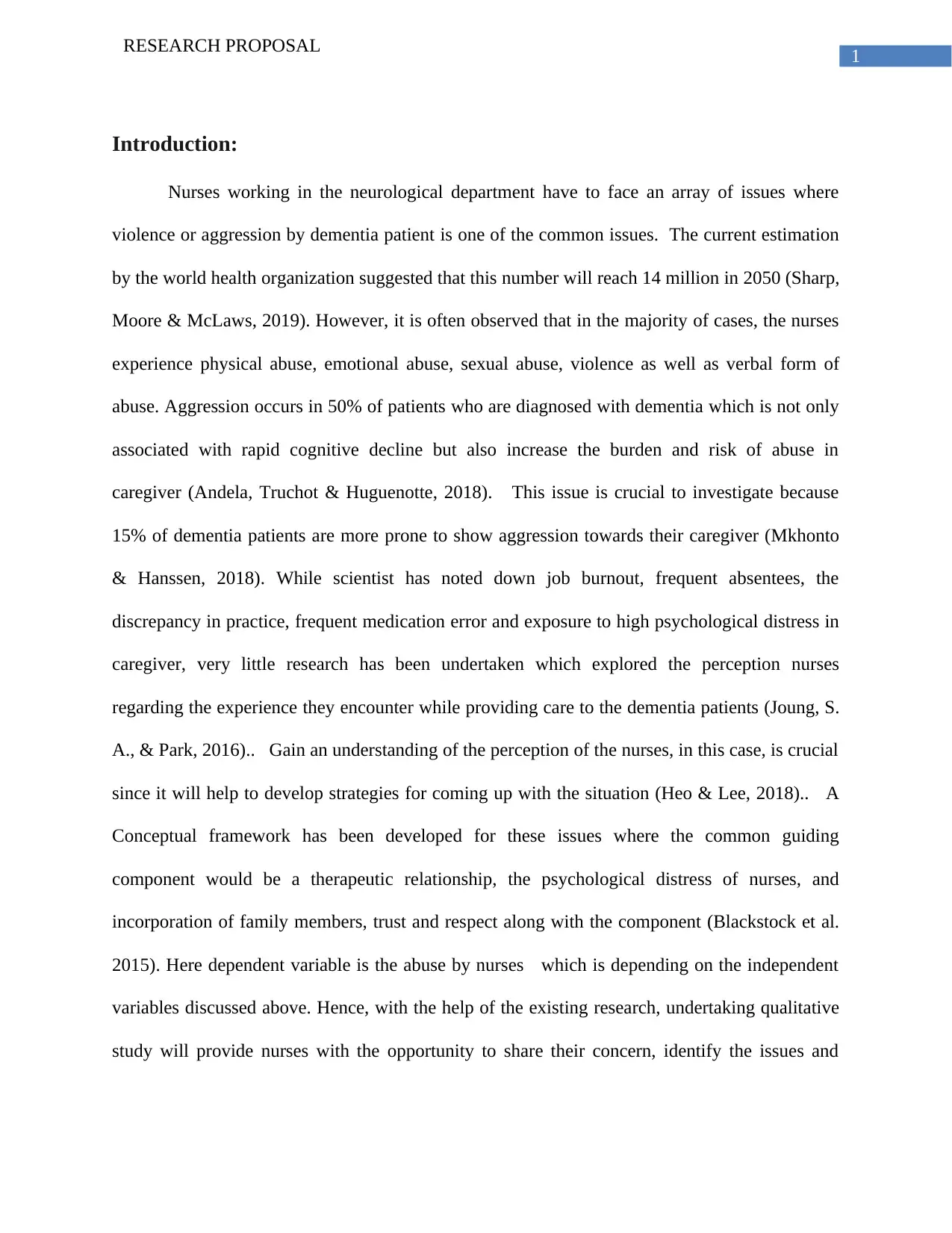
1
RESEARCH PROPOSAL
Introduction:
Nurses working in the neurological department have to face an array of issues where
violence or aggression by dementia patient is one of the common issues. The current estimation
by the world health organization suggested that this number will reach 14 million in 2050 (Sharp,
Moore & McLaws, 2019). However, it is often observed that in the majority of cases, the nurses
experience physical abuse, emotional abuse, sexual abuse, violence as well as verbal form of
abuse. Aggression occurs in 50% of patients who are diagnosed with dementia which is not only
associated with rapid cognitive decline but also increase the burden and risk of abuse in
caregiver (Andela, Truchot & Huguenotte, 2018). This issue is crucial to investigate because
15% of dementia patients are more prone to show aggression towards their caregiver (Mkhonto
& Hanssen, 2018). While scientist has noted down job burnout, frequent absentees, the
discrepancy in practice, frequent medication error and exposure to high psychological distress in
caregiver, very little research has been undertaken which explored the perception nurses
regarding the experience they encounter while providing care to the dementia patients (Joung, S.
A., & Park, 2016).. Gain an understanding of the perception of the nurses, in this case, is crucial
since it will help to develop strategies for coming up with the situation (Heo & Lee, 2018).. A
Conceptual framework has been developed for these issues where the common guiding
component would be a therapeutic relationship, the psychological distress of nurses, and
incorporation of family members, trust and respect along with the component (Blackstock et al.
2015). Here dependent variable is the abuse by nurses which is depending on the independent
variables discussed above. Hence, with the help of the existing research, undertaking qualitative
study will provide nurses with the opportunity to share their concern, identify the issues and
RESEARCH PROPOSAL
Introduction:
Nurses working in the neurological department have to face an array of issues where
violence or aggression by dementia patient is one of the common issues. The current estimation
by the world health organization suggested that this number will reach 14 million in 2050 (Sharp,
Moore & McLaws, 2019). However, it is often observed that in the majority of cases, the nurses
experience physical abuse, emotional abuse, sexual abuse, violence as well as verbal form of
abuse. Aggression occurs in 50% of patients who are diagnosed with dementia which is not only
associated with rapid cognitive decline but also increase the burden and risk of abuse in
caregiver (Andela, Truchot & Huguenotte, 2018). This issue is crucial to investigate because
15% of dementia patients are more prone to show aggression towards their caregiver (Mkhonto
& Hanssen, 2018). While scientist has noted down job burnout, frequent absentees, the
discrepancy in practice, frequent medication error and exposure to high psychological distress in
caregiver, very little research has been undertaken which explored the perception nurses
regarding the experience they encounter while providing care to the dementia patients (Joung, S.
A., & Park, 2016).. Gain an understanding of the perception of the nurses, in this case, is crucial
since it will help to develop strategies for coming up with the situation (Heo & Lee, 2018).. A
Conceptual framework has been developed for these issues where the common guiding
component would be a therapeutic relationship, the psychological distress of nurses, and
incorporation of family members, trust and respect along with the component (Blackstock et al.
2015). Here dependent variable is the abuse by nurses which is depending on the independent
variables discussed above. Hence, with the help of the existing research, undertaking qualitative
study will provide nurses with the opportunity to share their concern, identify the issues and
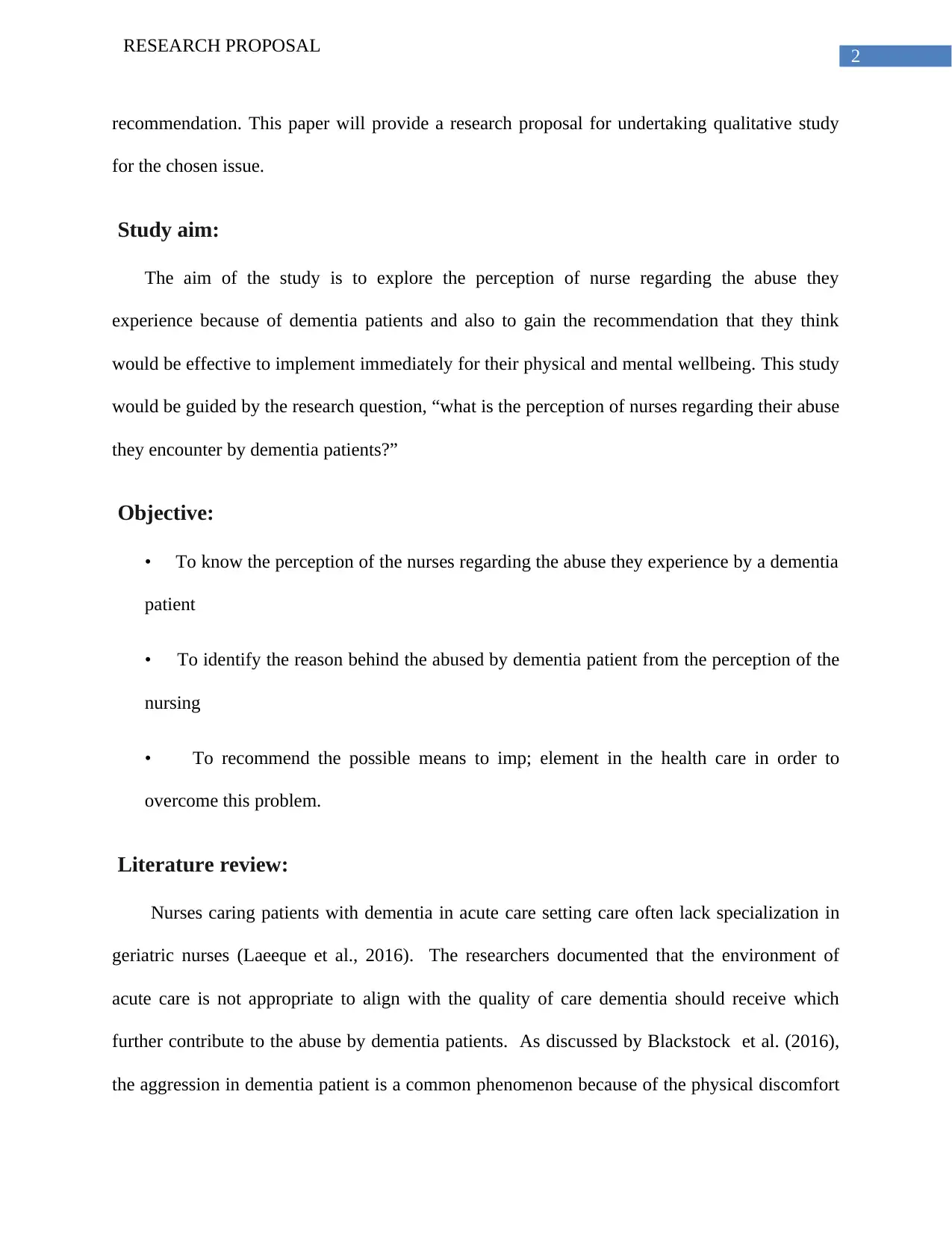
2
RESEARCH PROPOSAL
recommendation. This paper will provide a research proposal for undertaking qualitative study
for the chosen issue.
Study aim:
The aim of the study is to explore the perception of nurse regarding the abuse they
experience because of dementia patients and also to gain the recommendation that they think
would be effective to implement immediately for their physical and mental wellbeing. This study
would be guided by the research question, “what is the perception of nurses regarding their abuse
they encounter by dementia patients?”
Objective:
• To know the perception of the nurses regarding the abuse they experience by a dementia
patient
• To identify the reason behind the abused by dementia patient from the perception of the
nursing
• To recommend the possible means to imp; element in the health care in order to
overcome this problem.
Literature review:
Nurses caring patients with dementia in acute care setting care often lack specialization in
geriatric nurses (Laeeque et al., 2016). The researchers documented that the environment of
acute care is not appropriate to align with the quality of care dementia should receive which
further contribute to the abuse by dementia patients. As discussed by Blackstock et al. (2016),
the aggression in dementia patient is a common phenomenon because of the physical discomfort
RESEARCH PROPOSAL
recommendation. This paper will provide a research proposal for undertaking qualitative study
for the chosen issue.
Study aim:
The aim of the study is to explore the perception of nurse regarding the abuse they
experience because of dementia patients and also to gain the recommendation that they think
would be effective to implement immediately for their physical and mental wellbeing. This study
would be guided by the research question, “what is the perception of nurses regarding their abuse
they encounter by dementia patients?”
Objective:
• To know the perception of the nurses regarding the abuse they experience by a dementia
patient
• To identify the reason behind the abused by dementia patient from the perception of the
nursing
• To recommend the possible means to imp; element in the health care in order to
overcome this problem.
Literature review:
Nurses caring patients with dementia in acute care setting care often lack specialization in
geriatric nurses (Laeeque et al., 2016). The researchers documented that the environment of
acute care is not appropriate to align with the quality of care dementia should receive which
further contribute to the abuse by dementia patients. As discussed by Blackstock et al. (2016),
the aggression in dementia patient is a common phenomenon because of the physical discomfort
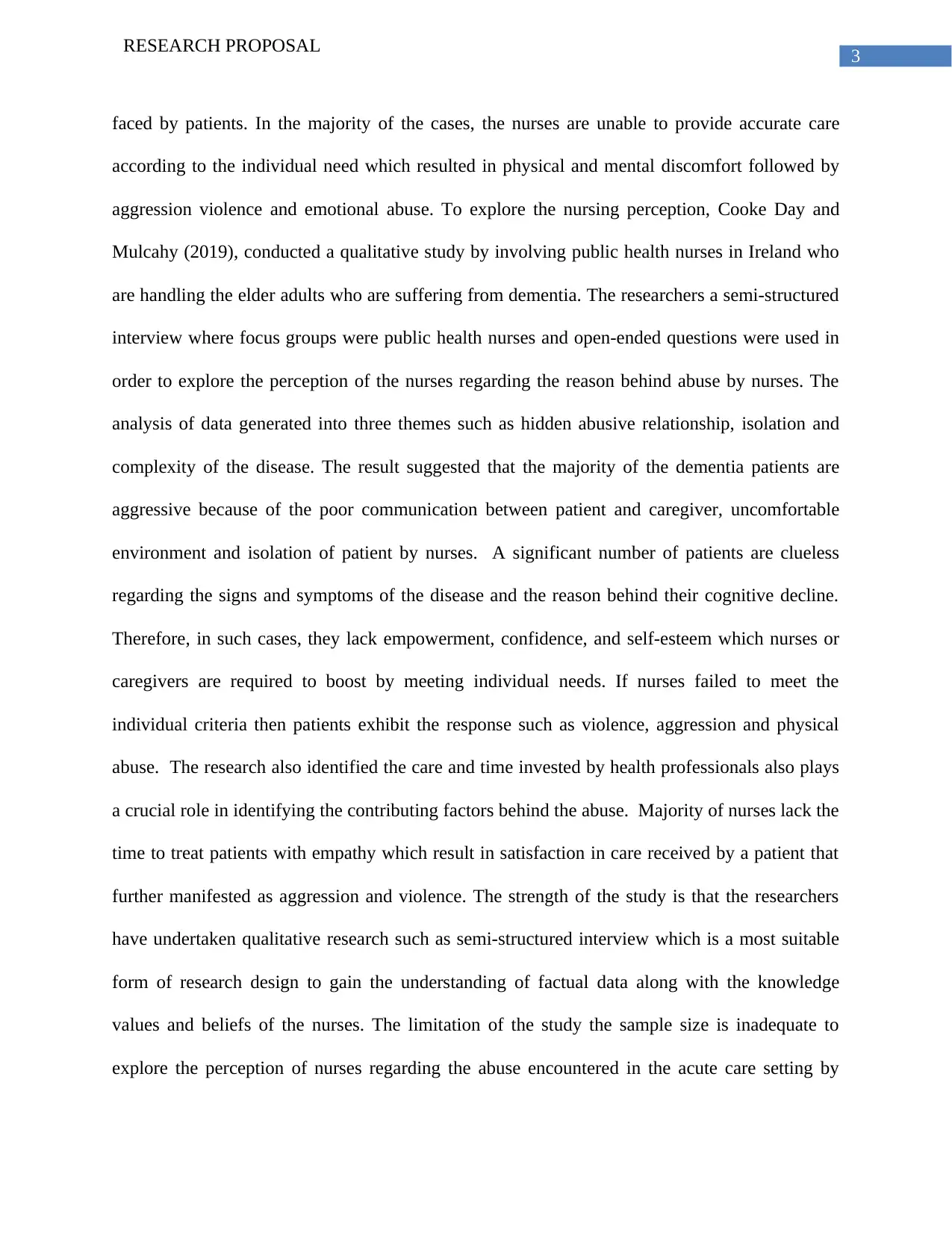
3
RESEARCH PROPOSAL
faced by patients. In the majority of the cases, the nurses are unable to provide accurate care
according to the individual need which resulted in physical and mental discomfort followed by
aggression violence and emotional abuse. To explore the nursing perception, Cooke Day and
Mulcahy (2019), conducted a qualitative study by involving public health nurses in Ireland who
are handling the elder adults who are suffering from dementia. The researchers a semi-structured
interview where focus groups were public health nurses and open-ended questions were used in
order to explore the perception of the nurses regarding the reason behind abuse by nurses. The
analysis of data generated into three themes such as hidden abusive relationship, isolation and
complexity of the disease. The result suggested that the majority of the dementia patients are
aggressive because of the poor communication between patient and caregiver, uncomfortable
environment and isolation of patient by nurses. A significant number of patients are clueless
regarding the signs and symptoms of the disease and the reason behind their cognitive decline.
Therefore, in such cases, they lack empowerment, confidence, and self-esteem which nurses or
caregivers are required to boost by meeting individual needs. If nurses failed to meet the
individual criteria then patients exhibit the response such as violence, aggression and physical
abuse. The research also identified the care and time invested by health professionals also plays
a crucial role in identifying the contributing factors behind the abuse. Majority of nurses lack the
time to treat patients with empathy which result in satisfaction in care received by a patient that
further manifested as aggression and violence. The strength of the study is that the researchers
have undertaken qualitative research such as semi-structured interview which is a most suitable
form of research design to gain the understanding of factual data along with the knowledge
values and beliefs of the nurses. The limitation of the study the sample size is inadequate to
explore the perception of nurses regarding the abuse encountered in the acute care setting by
RESEARCH PROPOSAL
faced by patients. In the majority of the cases, the nurses are unable to provide accurate care
according to the individual need which resulted in physical and mental discomfort followed by
aggression violence and emotional abuse. To explore the nursing perception, Cooke Day and
Mulcahy (2019), conducted a qualitative study by involving public health nurses in Ireland who
are handling the elder adults who are suffering from dementia. The researchers a semi-structured
interview where focus groups were public health nurses and open-ended questions were used in
order to explore the perception of the nurses regarding the reason behind abuse by nurses. The
analysis of data generated into three themes such as hidden abusive relationship, isolation and
complexity of the disease. The result suggested that the majority of the dementia patients are
aggressive because of the poor communication between patient and caregiver, uncomfortable
environment and isolation of patient by nurses. A significant number of patients are clueless
regarding the signs and symptoms of the disease and the reason behind their cognitive decline.
Therefore, in such cases, they lack empowerment, confidence, and self-esteem which nurses or
caregivers are required to boost by meeting individual needs. If nurses failed to meet the
individual criteria then patients exhibit the response such as violence, aggression and physical
abuse. The research also identified the care and time invested by health professionals also plays
a crucial role in identifying the contributing factors behind the abuse. Majority of nurses lack the
time to treat patients with empathy which result in satisfaction in care received by a patient that
further manifested as aggression and violence. The strength of the study is that the researchers
have undertaken qualitative research such as semi-structured interview which is a most suitable
form of research design to gain the understanding of factual data along with the knowledge
values and beliefs of the nurses. The limitation of the study the sample size is inadequate to
explore the perception of nurses regarding the abuse encountered in the acute care setting by
Secure Best Marks with AI Grader
Need help grading? Try our AI Grader for instant feedback on your assignments.
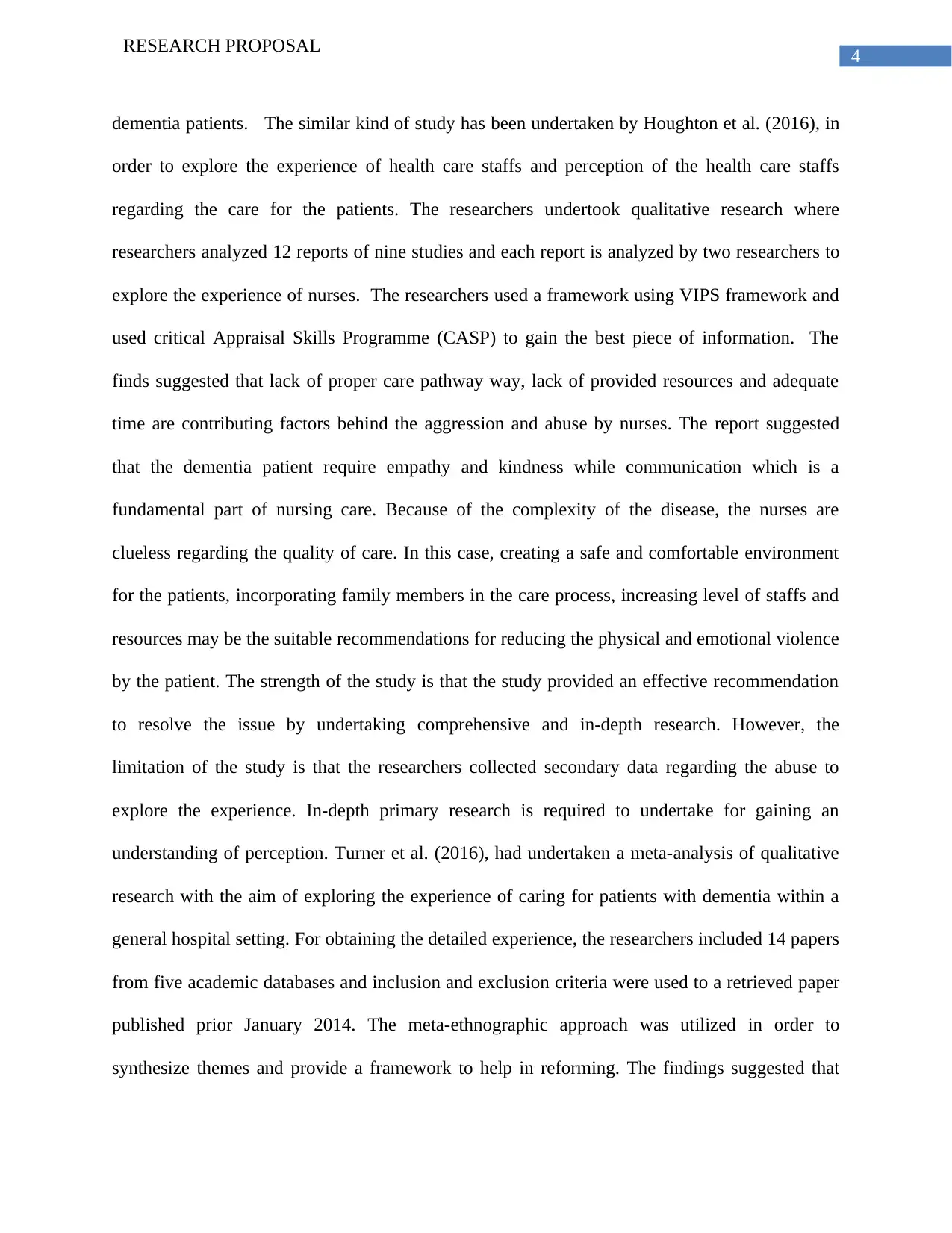
4
RESEARCH PROPOSAL
dementia patients. The similar kind of study has been undertaken by Houghton et al. (2016), in
order to explore the experience of health care staffs and perception of the health care staffs
regarding the care for the patients. The researchers undertook qualitative research where
researchers analyzed 12 reports of nine studies and each report is analyzed by two researchers to
explore the experience of nurses. The researchers used a framework using VIPS framework and
used critical Appraisal Skills Programme (CASP) to gain the best piece of information. The
finds suggested that lack of proper care pathway way, lack of provided resources and adequate
time are contributing factors behind the aggression and abuse by nurses. The report suggested
that the dementia patient require empathy and kindness while communication which is a
fundamental part of nursing care. Because of the complexity of the disease, the nurses are
clueless regarding the quality of care. In this case, creating a safe and comfortable environment
for the patients, incorporating family members in the care process, increasing level of staffs and
resources may be the suitable recommendations for reducing the physical and emotional violence
by the patient. The strength of the study is that the study provided an effective recommendation
to resolve the issue by undertaking comprehensive and in-depth research. However, the
limitation of the study is that the researchers collected secondary data regarding the abuse to
explore the experience. In-depth primary research is required to undertake for gaining an
understanding of perception. Turner et al. (2016), had undertaken a meta-analysis of qualitative
research with the aim of exploring the experience of caring for patients with dementia within a
general hospital setting. For obtaining the detailed experience, the researchers included 14 papers
from five academic databases and inclusion and exclusion criteria were used to a retrieved paper
published prior January 2014. The meta-ethnographic approach was utilized in order to
synthesize themes and provide a framework to help in reforming. The findings suggested that
RESEARCH PROPOSAL
dementia patients. The similar kind of study has been undertaken by Houghton et al. (2016), in
order to explore the experience of health care staffs and perception of the health care staffs
regarding the care for the patients. The researchers undertook qualitative research where
researchers analyzed 12 reports of nine studies and each report is analyzed by two researchers to
explore the experience of nurses. The researchers used a framework using VIPS framework and
used critical Appraisal Skills Programme (CASP) to gain the best piece of information. The
finds suggested that lack of proper care pathway way, lack of provided resources and adequate
time are contributing factors behind the aggression and abuse by nurses. The report suggested
that the dementia patient require empathy and kindness while communication which is a
fundamental part of nursing care. Because of the complexity of the disease, the nurses are
clueless regarding the quality of care. In this case, creating a safe and comfortable environment
for the patients, incorporating family members in the care process, increasing level of staffs and
resources may be the suitable recommendations for reducing the physical and emotional violence
by the patient. The strength of the study is that the study provided an effective recommendation
to resolve the issue by undertaking comprehensive and in-depth research. However, the
limitation of the study is that the researchers collected secondary data regarding the abuse to
explore the experience. In-depth primary research is required to undertake for gaining an
understanding of perception. Turner et al. (2016), had undertaken a meta-analysis of qualitative
research with the aim of exploring the experience of caring for patients with dementia within a
general hospital setting. For obtaining the detailed experience, the researchers included 14 papers
from five academic databases and inclusion and exclusion criteria were used to a retrieved paper
published prior January 2014. The meta-ethnographic approach was utilized in order to
synthesize themes and provide a framework to help in reforming. The findings suggested that
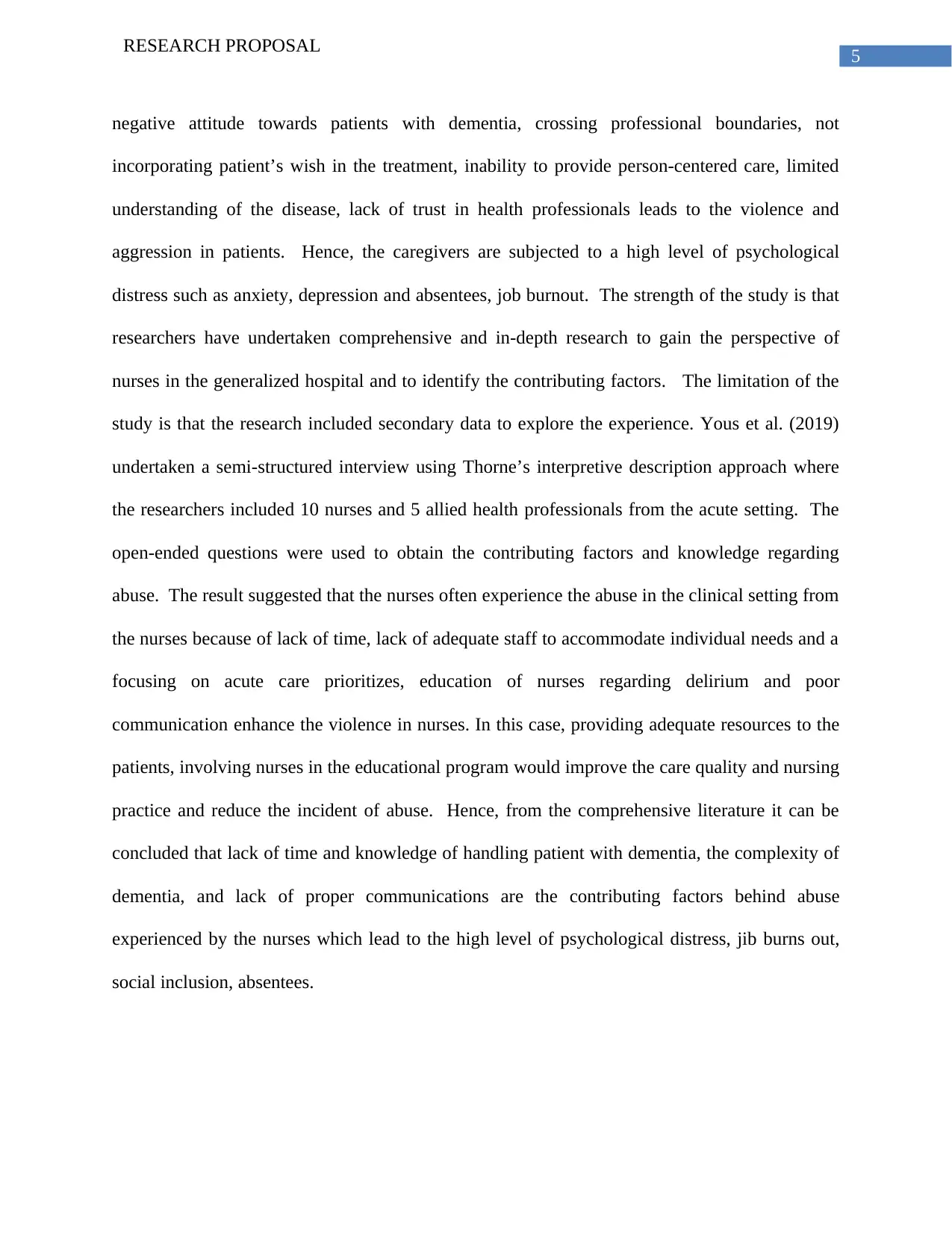
5
RESEARCH PROPOSAL
negative attitude towards patients with dementia, crossing professional boundaries, not
incorporating patient’s wish in the treatment, inability to provide person-centered care, limited
understanding of the disease, lack of trust in health professionals leads to the violence and
aggression in patients. Hence, the caregivers are subjected to a high level of psychological
distress such as anxiety, depression and absentees, job burnout. The strength of the study is that
researchers have undertaken comprehensive and in-depth research to gain the perspective of
nurses in the generalized hospital and to identify the contributing factors. The limitation of the
study is that the research included secondary data to explore the experience. Yous et al. (2019)
undertaken a semi-structured interview using Thorne’s interpretive description approach where
the researchers included 10 nurses and 5 allied health professionals from the acute setting. The
open-ended questions were used to obtain the contributing factors and knowledge regarding
abuse. The result suggested that the nurses often experience the abuse in the clinical setting from
the nurses because of lack of time, lack of adequate staff to accommodate individual needs and a
focusing on acute care prioritizes, education of nurses regarding delirium and poor
communication enhance the violence in nurses. In this case, providing adequate resources to the
patients, involving nurses in the educational program would improve the care quality and nursing
practice and reduce the incident of abuse. Hence, from the comprehensive literature it can be
concluded that lack of time and knowledge of handling patient with dementia, the complexity of
dementia, and lack of proper communications are the contributing factors behind abuse
experienced by the nurses which lead to the high level of psychological distress, jib burns out,
social inclusion, absentees.
RESEARCH PROPOSAL
negative attitude towards patients with dementia, crossing professional boundaries, not
incorporating patient’s wish in the treatment, inability to provide person-centered care, limited
understanding of the disease, lack of trust in health professionals leads to the violence and
aggression in patients. Hence, the caregivers are subjected to a high level of psychological
distress such as anxiety, depression and absentees, job burnout. The strength of the study is that
researchers have undertaken comprehensive and in-depth research to gain the perspective of
nurses in the generalized hospital and to identify the contributing factors. The limitation of the
study is that the research included secondary data to explore the experience. Yous et al. (2019)
undertaken a semi-structured interview using Thorne’s interpretive description approach where
the researchers included 10 nurses and 5 allied health professionals from the acute setting. The
open-ended questions were used to obtain the contributing factors and knowledge regarding
abuse. The result suggested that the nurses often experience the abuse in the clinical setting from
the nurses because of lack of time, lack of adequate staff to accommodate individual needs and a
focusing on acute care prioritizes, education of nurses regarding delirium and poor
communication enhance the violence in nurses. In this case, providing adequate resources to the
patients, involving nurses in the educational program would improve the care quality and nursing
practice and reduce the incident of abuse. Hence, from the comprehensive literature it can be
concluded that lack of time and knowledge of handling patient with dementia, the complexity of
dementia, and lack of proper communications are the contributing factors behind abuse
experienced by the nurses which lead to the high level of psychological distress, jib burns out,
social inclusion, absentees.
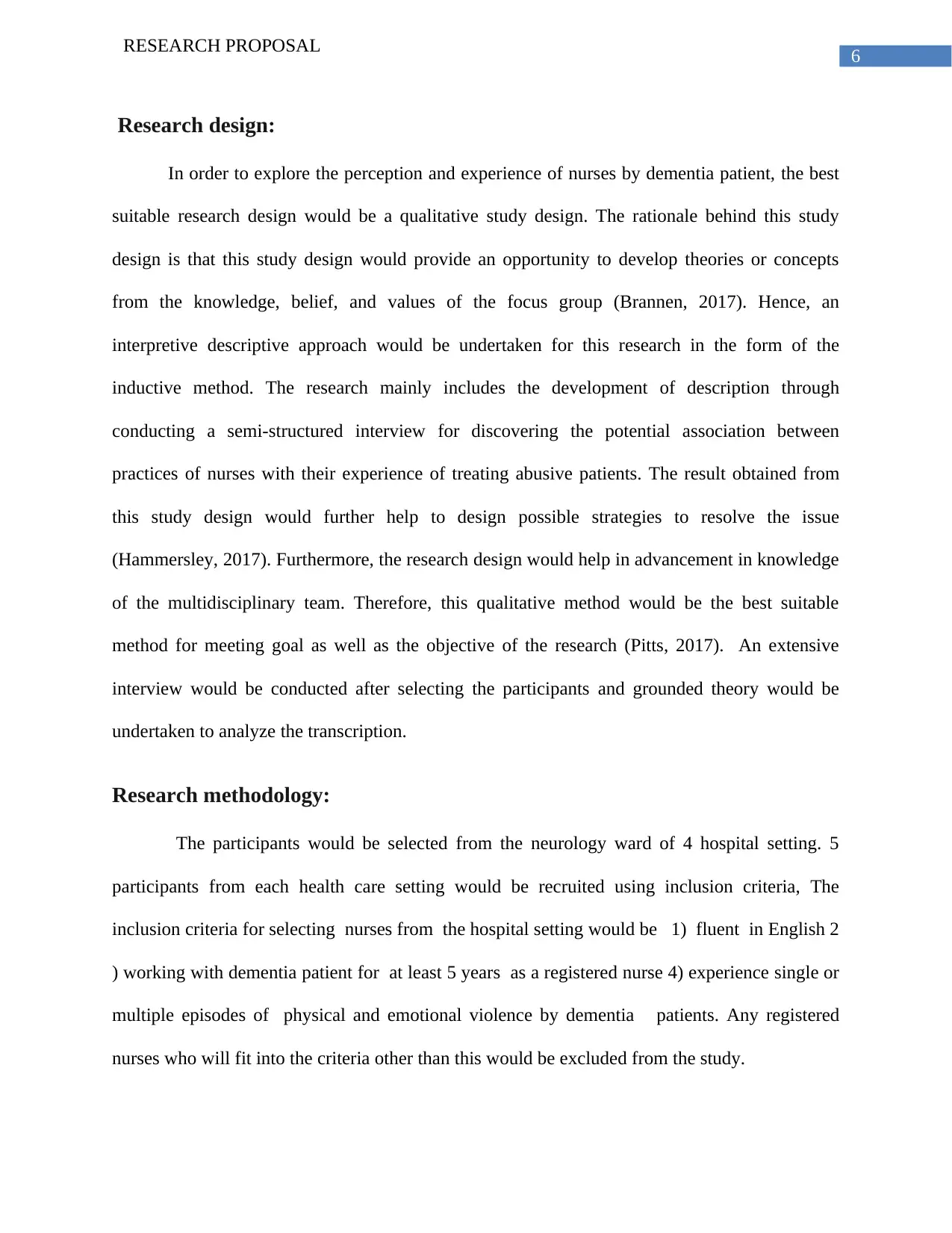
6
RESEARCH PROPOSAL
Research design:
In order to explore the perception and experience of nurses by dementia patient, the best
suitable research design would be a qualitative study design. The rationale behind this study
design is that this study design would provide an opportunity to develop theories or concepts
from the knowledge, belief, and values of the focus group (Brannen, 2017). Hence, an
interpretive descriptive approach would be undertaken for this research in the form of the
inductive method. The research mainly includes the development of description through
conducting a semi-structured interview for discovering the potential association between
practices of nurses with their experience of treating abusive patients. The result obtained from
this study design would further help to design possible strategies to resolve the issue
(Hammersley, 2017). Furthermore, the research design would help in advancement in knowledge
of the multidisciplinary team. Therefore, this qualitative method would be the best suitable
method for meeting goal as well as the objective of the research (Pitts, 2017). An extensive
interview would be conducted after selecting the participants and grounded theory would be
undertaken to analyze the transcription.
Research methodology:
The participants would be selected from the neurology ward of 4 hospital setting. 5
participants from each health care setting would be recruited using inclusion criteria, The
inclusion criteria for selecting nurses from the hospital setting would be 1) fluent in English 2
) working with dementia patient for at least 5 years as a registered nurse 4) experience single or
multiple episodes of physical and emotional violence by dementia patients. Any registered
nurses who will fit into the criteria other than this would be excluded from the study.
RESEARCH PROPOSAL
Research design:
In order to explore the perception and experience of nurses by dementia patient, the best
suitable research design would be a qualitative study design. The rationale behind this study
design is that this study design would provide an opportunity to develop theories or concepts
from the knowledge, belief, and values of the focus group (Brannen, 2017). Hence, an
interpretive descriptive approach would be undertaken for this research in the form of the
inductive method. The research mainly includes the development of description through
conducting a semi-structured interview for discovering the potential association between
practices of nurses with their experience of treating abusive patients. The result obtained from
this study design would further help to design possible strategies to resolve the issue
(Hammersley, 2017). Furthermore, the research design would help in advancement in knowledge
of the multidisciplinary team. Therefore, this qualitative method would be the best suitable
method for meeting goal as well as the objective of the research (Pitts, 2017). An extensive
interview would be conducted after selecting the participants and grounded theory would be
undertaken to analyze the transcription.
Research methodology:
The participants would be selected from the neurology ward of 4 hospital setting. 5
participants from each health care setting would be recruited using inclusion criteria, The
inclusion criteria for selecting nurses from the hospital setting would be 1) fluent in English 2
) working with dementia patient for at least 5 years as a registered nurse 4) experience single or
multiple episodes of physical and emotional violence by dementia patients. Any registered
nurses who will fit into the criteria other than this would be excluded from the study.
Paraphrase This Document
Need a fresh take? Get an instant paraphrase of this document with our AI Paraphraser
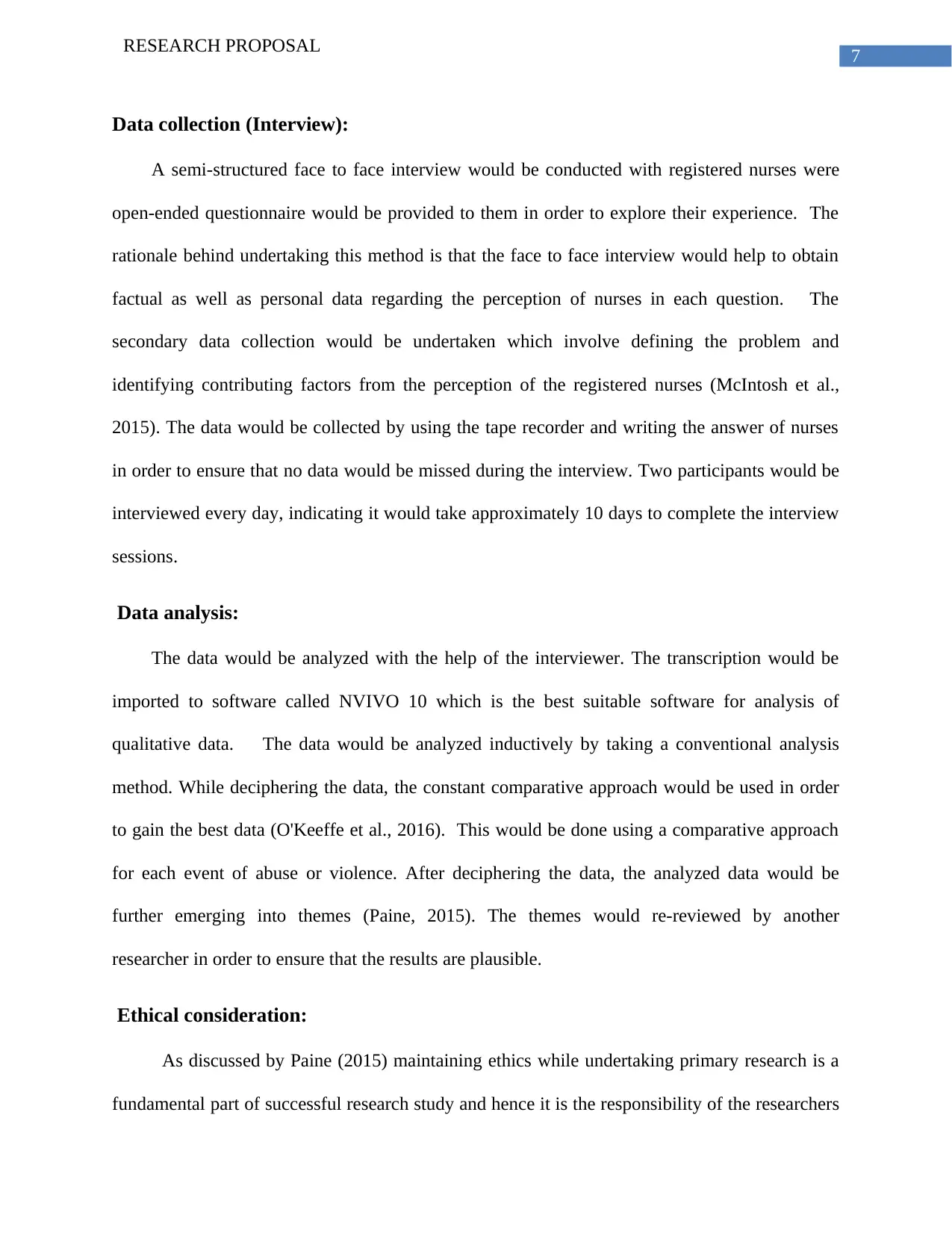
7
RESEARCH PROPOSAL
Data collection (Interview):
A semi-structured face to face interview would be conducted with registered nurses were
open-ended questionnaire would be provided to them in order to explore their experience. The
rationale behind undertaking this method is that the face to face interview would help to obtain
factual as well as personal data regarding the perception of nurses in each question. The
secondary data collection would be undertaken which involve defining the problem and
identifying contributing factors from the perception of the registered nurses (McIntosh et al.,
2015). The data would be collected by using the tape recorder and writing the answer of nurses
in order to ensure that no data would be missed during the interview. Two participants would be
interviewed every day, indicating it would take approximately 10 days to complete the interview
sessions.
Data analysis:
The data would be analyzed with the help of the interviewer. The transcription would be
imported to software called NVIVO 10 which is the best suitable software for analysis of
qualitative data. The data would be analyzed inductively by taking a conventional analysis
method. While deciphering the data, the constant comparative approach would be used in order
to gain the best data (O'Keeffe et al., 2016). This would be done using a comparative approach
for each event of abuse or violence. After deciphering the data, the analyzed data would be
further emerging into themes (Paine, 2015). The themes would re-reviewed by another
researcher in order to ensure that the results are plausible.
Ethical consideration:
As discussed by Paine (2015) maintaining ethics while undertaking primary research is a
fundamental part of successful research study and hence it is the responsibility of the researchers
RESEARCH PROPOSAL
Data collection (Interview):
A semi-structured face to face interview would be conducted with registered nurses were
open-ended questionnaire would be provided to them in order to explore their experience. The
rationale behind undertaking this method is that the face to face interview would help to obtain
factual as well as personal data regarding the perception of nurses in each question. The
secondary data collection would be undertaken which involve defining the problem and
identifying contributing factors from the perception of the registered nurses (McIntosh et al.,
2015). The data would be collected by using the tape recorder and writing the answer of nurses
in order to ensure that no data would be missed during the interview. Two participants would be
interviewed every day, indicating it would take approximately 10 days to complete the interview
sessions.
Data analysis:
The data would be analyzed with the help of the interviewer. The transcription would be
imported to software called NVIVO 10 which is the best suitable software for analysis of
qualitative data. The data would be analyzed inductively by taking a conventional analysis
method. While deciphering the data, the constant comparative approach would be used in order
to gain the best data (O'Keeffe et al., 2016). This would be done using a comparative approach
for each event of abuse or violence. After deciphering the data, the analyzed data would be
further emerging into themes (Paine, 2015). The themes would re-reviewed by another
researcher in order to ensure that the results are plausible.
Ethical consideration:
As discussed by Paine (2015) maintaining ethics while undertaking primary research is a
fundamental part of successful research study and hence it is the responsibility of the researchers
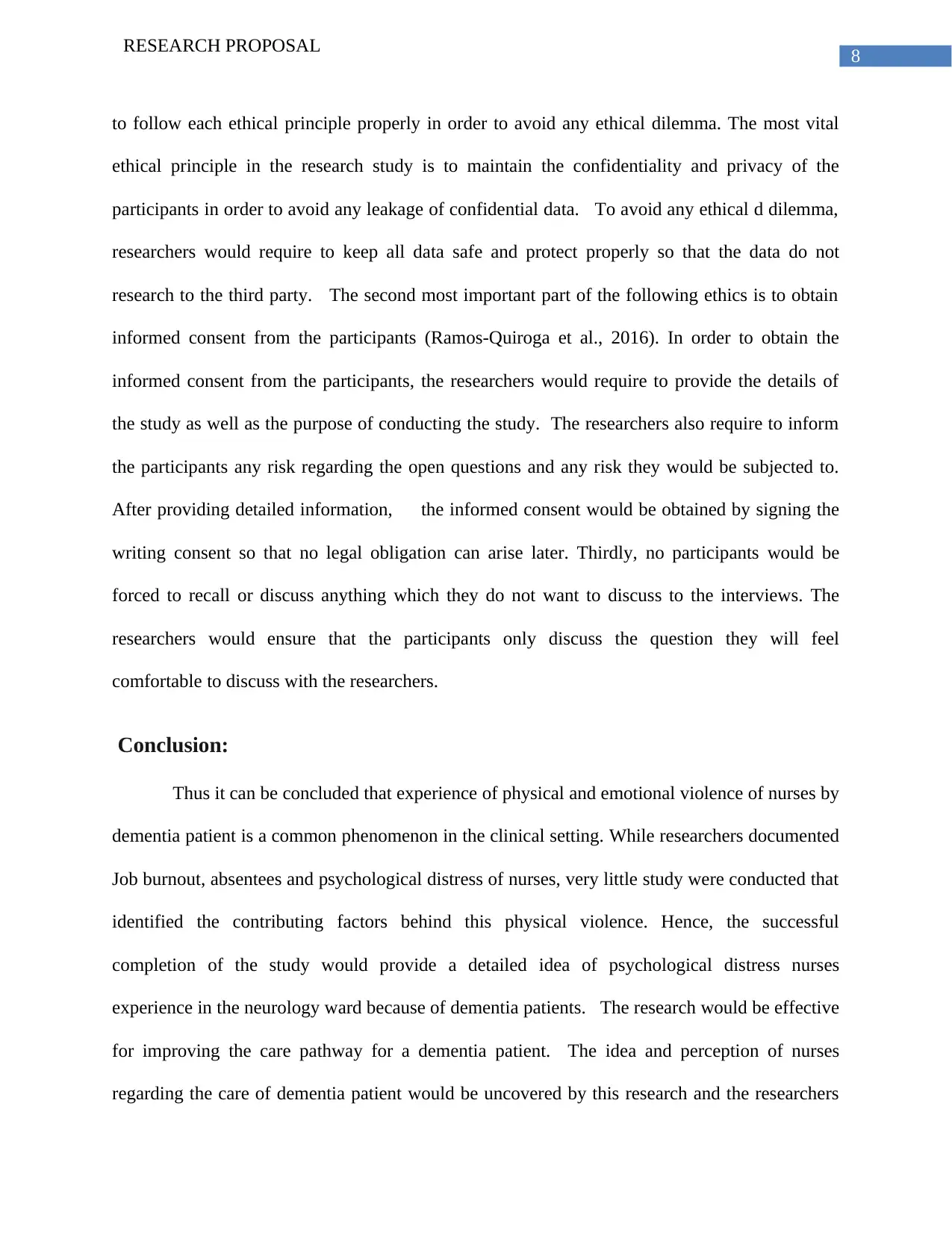
8
RESEARCH PROPOSAL
to follow each ethical principle properly in order to avoid any ethical dilemma. The most vital
ethical principle in the research study is to maintain the confidentiality and privacy of the
participants in order to avoid any leakage of confidential data. To avoid any ethical d dilemma,
researchers would require to keep all data safe and protect properly so that the data do not
research to the third party. The second most important part of the following ethics is to obtain
informed consent from the participants (Ramos-Quiroga et al., 2016). In order to obtain the
informed consent from the participants, the researchers would require to provide the details of
the study as well as the purpose of conducting the study. The researchers also require to inform
the participants any risk regarding the open questions and any risk they would be subjected to.
After providing detailed information, the informed consent would be obtained by signing the
writing consent so that no legal obligation can arise later. Thirdly, no participants would be
forced to recall or discuss anything which they do not want to discuss to the interviews. The
researchers would ensure that the participants only discuss the question they will feel
comfortable to discuss with the researchers.
Conclusion:
Thus it can be concluded that experience of physical and emotional violence of nurses by
dementia patient is a common phenomenon in the clinical setting. While researchers documented
Job burnout, absentees and psychological distress of nurses, very little study were conducted that
identified the contributing factors behind this physical violence. Hence, the successful
completion of the study would provide a detailed idea of psychological distress nurses
experience in the neurology ward because of dementia patients. The research would be effective
for improving the care pathway for a dementia patient. The idea and perception of nurses
regarding the care of dementia patient would be uncovered by this research and the researchers
RESEARCH PROPOSAL
to follow each ethical principle properly in order to avoid any ethical dilemma. The most vital
ethical principle in the research study is to maintain the confidentiality and privacy of the
participants in order to avoid any leakage of confidential data. To avoid any ethical d dilemma,
researchers would require to keep all data safe and protect properly so that the data do not
research to the third party. The second most important part of the following ethics is to obtain
informed consent from the participants (Ramos-Quiroga et al., 2016). In order to obtain the
informed consent from the participants, the researchers would require to provide the details of
the study as well as the purpose of conducting the study. The researchers also require to inform
the participants any risk regarding the open questions and any risk they would be subjected to.
After providing detailed information, the informed consent would be obtained by signing the
writing consent so that no legal obligation can arise later. Thirdly, no participants would be
forced to recall or discuss anything which they do not want to discuss to the interviews. The
researchers would ensure that the participants only discuss the question they will feel
comfortable to discuss with the researchers.
Conclusion:
Thus it can be concluded that experience of physical and emotional violence of nurses by
dementia patient is a common phenomenon in the clinical setting. While researchers documented
Job burnout, absentees and psychological distress of nurses, very little study were conducted that
identified the contributing factors behind this physical violence. Hence, the successful
completion of the study would provide a detailed idea of psychological distress nurses
experience in the neurology ward because of dementia patients. The research would be effective
for improving the care pathway for a dementia patient. The idea and perception of nurses
regarding the care of dementia patient would be uncovered by this research and the researchers
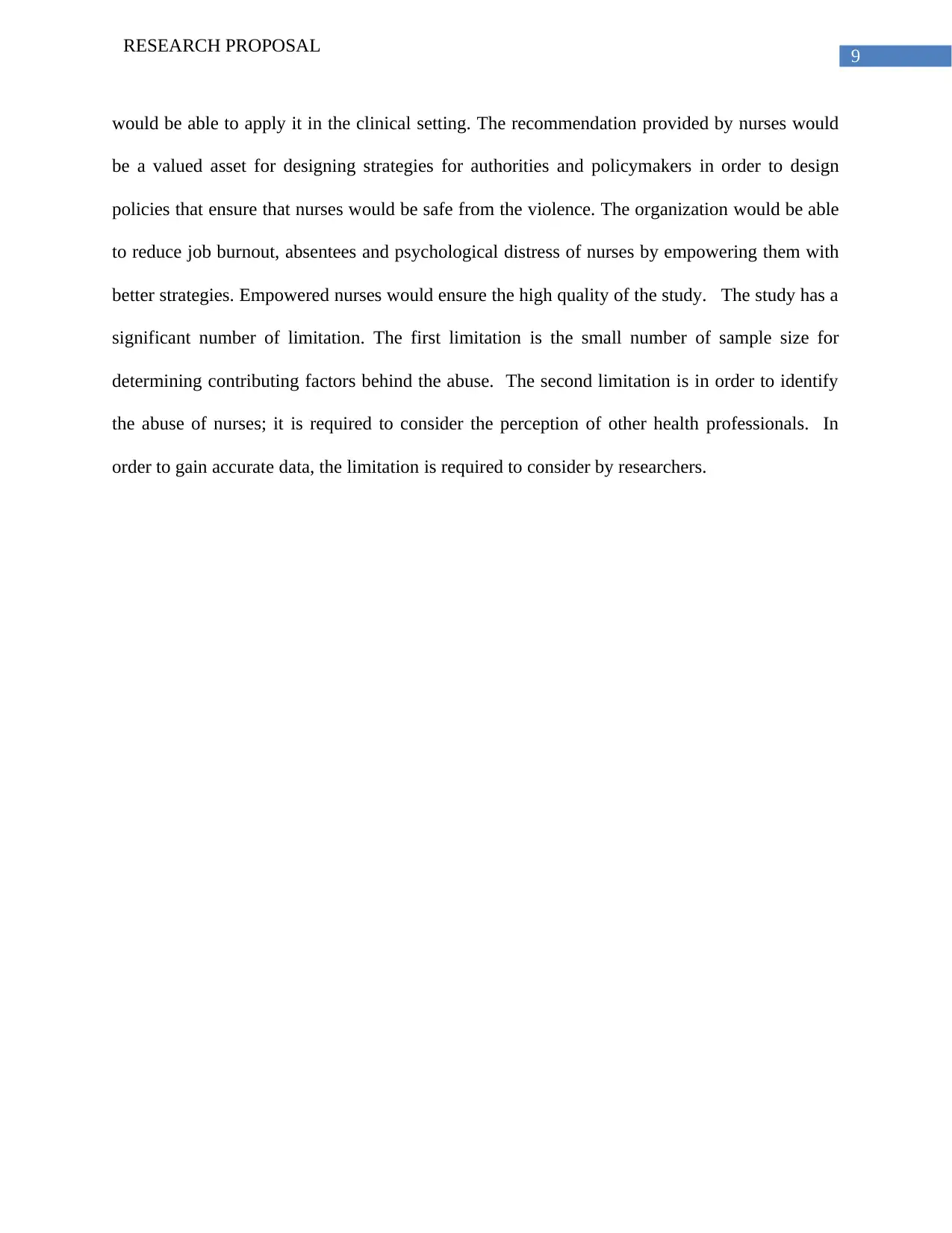
9
RESEARCH PROPOSAL
would be able to apply it in the clinical setting. The recommendation provided by nurses would
be a valued asset for designing strategies for authorities and policymakers in order to design
policies that ensure that nurses would be safe from the violence. The organization would be able
to reduce job burnout, absentees and psychological distress of nurses by empowering them with
better strategies. Empowered nurses would ensure the high quality of the study. The study has a
significant number of limitation. The first limitation is the small number of sample size for
determining contributing factors behind the abuse. The second limitation is in order to identify
the abuse of nurses; it is required to consider the perception of other health professionals. In
order to gain accurate data, the limitation is required to consider by researchers.
RESEARCH PROPOSAL
would be able to apply it in the clinical setting. The recommendation provided by nurses would
be a valued asset for designing strategies for authorities and policymakers in order to design
policies that ensure that nurses would be safe from the violence. The organization would be able
to reduce job burnout, absentees and psychological distress of nurses by empowering them with
better strategies. Empowered nurses would ensure the high quality of the study. The study has a
significant number of limitation. The first limitation is the small number of sample size for
determining contributing factors behind the abuse. The second limitation is in order to identify
the abuse of nurses; it is required to consider the perception of other health professionals. In
order to gain accurate data, the limitation is required to consider by researchers.
Secure Best Marks with AI Grader
Need help grading? Try our AI Grader for instant feedback on your assignments.
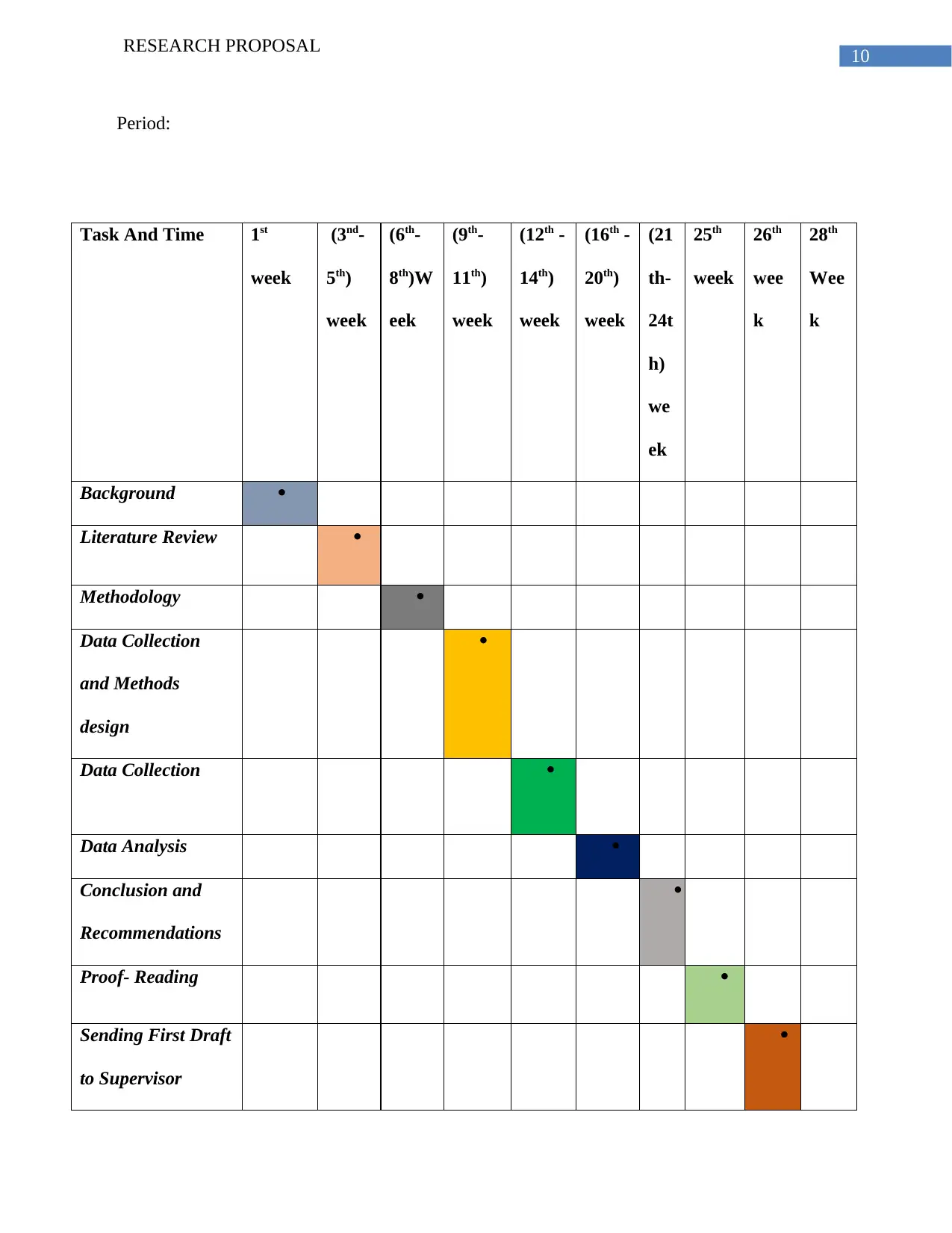
10
RESEARCH PROPOSAL
Period:
Task And Time 1st
week
(3nd-
5th)
week
(6th-
8th)W
eek
(9th-
11th)
week
(12th -
14th)
week
(16th -
20th)
week
(21
th-
24t
h)
we
ek
25th
week
26th
wee
k
28th
Wee
k
Background
Literature Review
Methodology
Data Collection
and Methods
design
Data Collection
Data Analysis
Conclusion and
Recommendations
Proof- Reading
Sending First Draft
to Supervisor
RESEARCH PROPOSAL
Period:
Task And Time 1st
week
(3nd-
5th)
week
(6th-
8th)W
eek
(9th-
11th)
week
(12th -
14th)
week
(16th -
20th)
week
(21
th-
24t
h)
we
ek
25th
week
26th
wee
k
28th
Wee
k
Background
Literature Review
Methodology
Data Collection
and Methods
design
Data Collection
Data Analysis
Conclusion and
Recommendations
Proof- Reading
Sending First Draft
to Supervisor

11
RESEARCH PROPOSAL
Printing, Binding
and Submission
Budget:
Members Description Amount
Space for research Rent for space $7000
Researchers involved in the
research
Salary $14500
Resources for literature
review
Online access to data bases,
copying and printing
$1200
Fund allocated for the
software and other
technologies
Data collection and
interpretation
$8000
Arrangements of
equipment’s
Proof reading , recording $1200
Equipment’s pens, papers and stationaries $1700
Others $1000
Total $34600
References:
RESEARCH PROPOSAL
Printing, Binding
and Submission
Budget:
Members Description Amount
Space for research Rent for space $7000
Researchers involved in the
research
Salary $14500
Resources for literature
review
Online access to data bases,
copying and printing
$1200
Fund allocated for the
software and other
technologies
Data collection and
interpretation
$8000
Arrangements of
equipment’s
Proof reading , recording $1200
Equipment’s pens, papers and stationaries $1700
Others $1000
Total $34600
References:
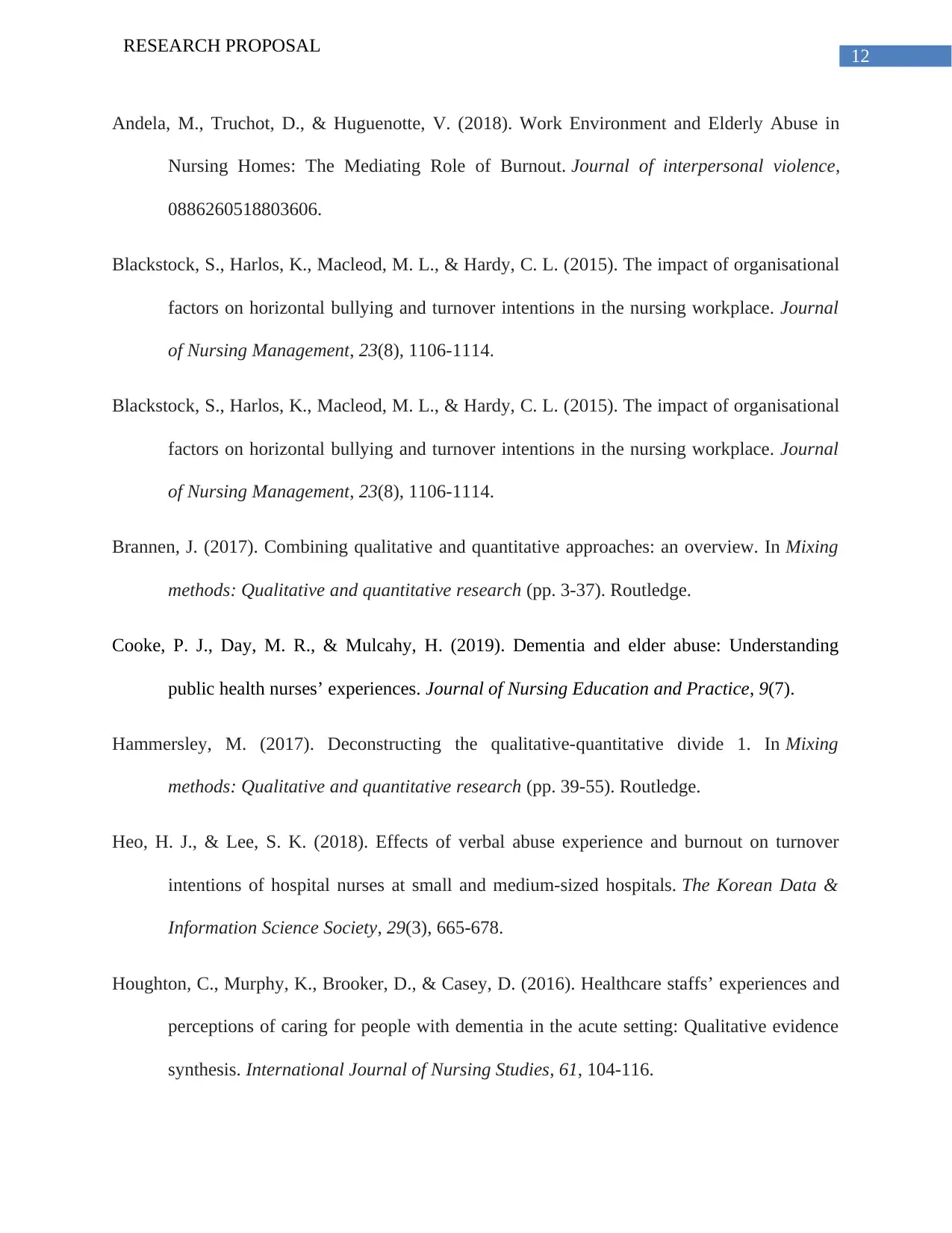
12
RESEARCH PROPOSAL
Andela, M., Truchot, D., & Huguenotte, V. (2018). Work Environment and Elderly Abuse in
Nursing Homes: The Mediating Role of Burnout. Journal of interpersonal violence,
0886260518803606.
Blackstock, S., Harlos, K., Macleod, M. L., & Hardy, C. L. (2015). The impact of organisational
factors on horizontal bullying and turnover intentions in the nursing workplace. Journal
of Nursing Management, 23(8), 1106-1114.
Blackstock, S., Harlos, K., Macleod, M. L., & Hardy, C. L. (2015). The impact of organisational
factors on horizontal bullying and turnover intentions in the nursing workplace. Journal
of Nursing Management, 23(8), 1106-1114.
Brannen, J. (2017). Combining qualitative and quantitative approaches: an overview. In Mixing
methods: Qualitative and quantitative research (pp. 3-37). Routledge.
Cooke, P. J., Day, M. R., & Mulcahy, H. (2019). Dementia and elder abuse: Understanding
public health nurses’ experiences. Journal of Nursing Education and Practice, 9(7).
Hammersley, M. (2017). Deconstructing the qualitative-quantitative divide 1. In Mixing
methods: Qualitative and quantitative research (pp. 39-55). Routledge.
Heo, H. J., & Lee, S. K. (2018). Effects of verbal abuse experience and burnout on turnover
intentions of hospital nurses at small and medium-sized hospitals. The Korean Data &
Information Science Society, 29(3), 665-678.
Houghton, C., Murphy, K., Brooker, D., & Casey, D. (2016). Healthcare staffs’ experiences and
perceptions of caring for people with dementia in the acute setting: Qualitative evidence
synthesis. International Journal of Nursing Studies, 61, 104-116.
RESEARCH PROPOSAL
Andela, M., Truchot, D., & Huguenotte, V. (2018). Work Environment and Elderly Abuse in
Nursing Homes: The Mediating Role of Burnout. Journal of interpersonal violence,
0886260518803606.
Blackstock, S., Harlos, K., Macleod, M. L., & Hardy, C. L. (2015). The impact of organisational
factors on horizontal bullying and turnover intentions in the nursing workplace. Journal
of Nursing Management, 23(8), 1106-1114.
Blackstock, S., Harlos, K., Macleod, M. L., & Hardy, C. L. (2015). The impact of organisational
factors on horizontal bullying and turnover intentions in the nursing workplace. Journal
of Nursing Management, 23(8), 1106-1114.
Brannen, J. (2017). Combining qualitative and quantitative approaches: an overview. In Mixing
methods: Qualitative and quantitative research (pp. 3-37). Routledge.
Cooke, P. J., Day, M. R., & Mulcahy, H. (2019). Dementia and elder abuse: Understanding
public health nurses’ experiences. Journal of Nursing Education and Practice, 9(7).
Hammersley, M. (2017). Deconstructing the qualitative-quantitative divide 1. In Mixing
methods: Qualitative and quantitative research (pp. 39-55). Routledge.
Heo, H. J., & Lee, S. K. (2018). Effects of verbal abuse experience and burnout on turnover
intentions of hospital nurses at small and medium-sized hospitals. The Korean Data &
Information Science Society, 29(3), 665-678.
Houghton, C., Murphy, K., Brooker, D., & Casey, D. (2016). Healthcare staffs’ experiences and
perceptions of caring for people with dementia in the acute setting: Qualitative evidence
synthesis. International Journal of Nursing Studies, 61, 104-116.
Paraphrase This Document
Need a fresh take? Get an instant paraphrase of this document with our AI Paraphraser
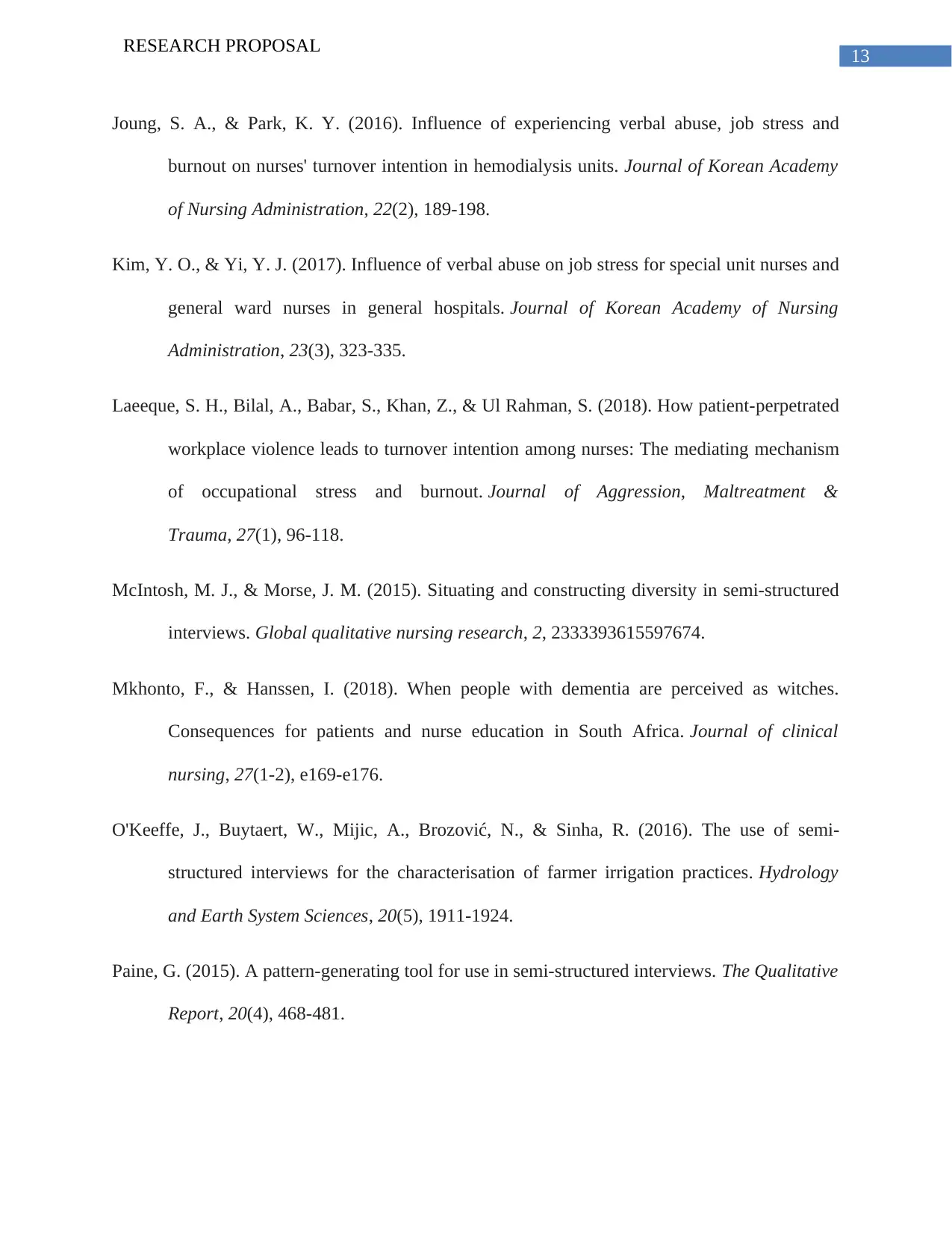
13
RESEARCH PROPOSAL
Joung, S. A., & Park, K. Y. (2016). Influence of experiencing verbal abuse, job stress and
burnout on nurses' turnover intention in hemodialysis units. Journal of Korean Academy
of Nursing Administration, 22(2), 189-198.
Kim, Y. O., & Yi, Y. J. (2017). Influence of verbal abuse on job stress for special unit nurses and
general ward nurses in general hospitals. Journal of Korean Academy of Nursing
Administration, 23(3), 323-335.
Laeeque, S. H., Bilal, A., Babar, S., Khan, Z., & Ul Rahman, S. (2018). How patient-perpetrated
workplace violence leads to turnover intention among nurses: The mediating mechanism
of occupational stress and burnout. Journal of Aggression, Maltreatment &
Trauma, 27(1), 96-118.
McIntosh, M. J., & Morse, J. M. (2015). Situating and constructing diversity in semi-structured
interviews. Global qualitative nursing research, 2, 2333393615597674.
Mkhonto, F., & Hanssen, I. (2018). When people with dementia are perceived as witches.
Consequences for patients and nurse education in South Africa. Journal of clinical
nursing, 27(1-2), e169-e176.
O'Keeffe, J., Buytaert, W., Mijic, A., Brozović, N., & Sinha, R. (2016). The use of semi-
structured interviews for the characterisation of farmer irrigation practices. Hydrology
and Earth System Sciences, 20(5), 1911-1924.
Paine, G. (2015). A pattern-generating tool for use in semi-structured interviews. The Qualitative
Report, 20(4), 468-481.
RESEARCH PROPOSAL
Joung, S. A., & Park, K. Y. (2016). Influence of experiencing verbal abuse, job stress and
burnout on nurses' turnover intention in hemodialysis units. Journal of Korean Academy
of Nursing Administration, 22(2), 189-198.
Kim, Y. O., & Yi, Y. J. (2017). Influence of verbal abuse on job stress for special unit nurses and
general ward nurses in general hospitals. Journal of Korean Academy of Nursing
Administration, 23(3), 323-335.
Laeeque, S. H., Bilal, A., Babar, S., Khan, Z., & Ul Rahman, S. (2018). How patient-perpetrated
workplace violence leads to turnover intention among nurses: The mediating mechanism
of occupational stress and burnout. Journal of Aggression, Maltreatment &
Trauma, 27(1), 96-118.
McIntosh, M. J., & Morse, J. M. (2015). Situating and constructing diversity in semi-structured
interviews. Global qualitative nursing research, 2, 2333393615597674.
Mkhonto, F., & Hanssen, I. (2018). When people with dementia are perceived as witches.
Consequences for patients and nurse education in South Africa. Journal of clinical
nursing, 27(1-2), e169-e176.
O'Keeffe, J., Buytaert, W., Mijic, A., Brozović, N., & Sinha, R. (2016). The use of semi-
structured interviews for the characterisation of farmer irrigation practices. Hydrology
and Earth System Sciences, 20(5), 1911-1924.
Paine, G. (2015). A pattern-generating tool for use in semi-structured interviews. The Qualitative
Report, 20(4), 468-481.
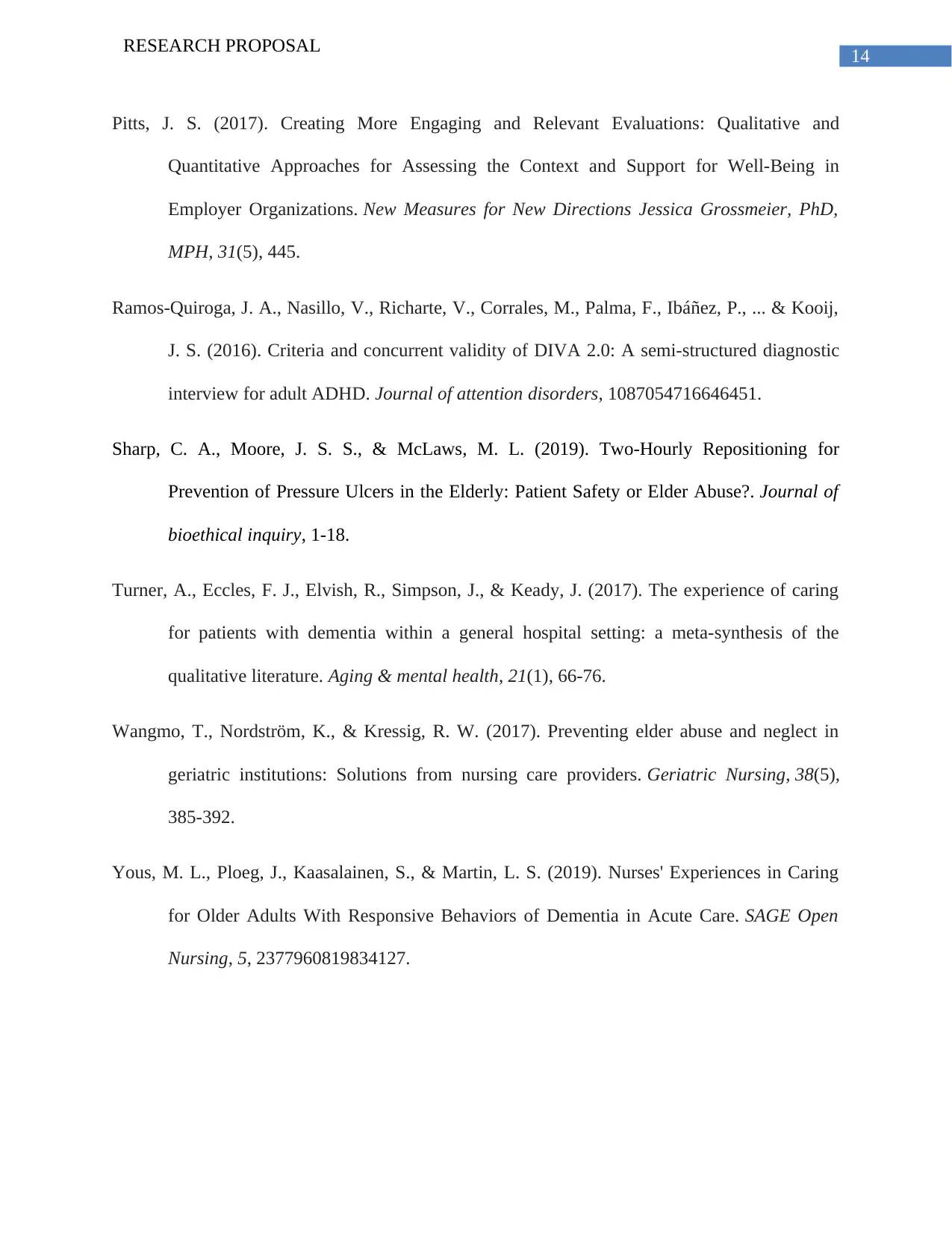
14
RESEARCH PROPOSAL
Pitts, J. S. (2017). Creating More Engaging and Relevant Evaluations: Qualitative and
Quantitative Approaches for Assessing the Context and Support for Well-Being in
Employer Organizations. New Measures for New Directions Jessica Grossmeier, PhD,
MPH, 31(5), 445.
Ramos-Quiroga, J. A., Nasillo, V., Richarte, V., Corrales, M., Palma, F., Ibáñez, P., ... & Kooij,
J. S. (2016). Criteria and concurrent validity of DIVA 2.0: A semi-structured diagnostic
interview for adult ADHD. Journal of attention disorders, 1087054716646451.
Sharp, C. A., Moore, J. S. S., & McLaws, M. L. (2019). Two-Hourly Repositioning for
Prevention of Pressure Ulcers in the Elderly: Patient Safety or Elder Abuse?. Journal of
bioethical inquiry, 1-18.
Turner, A., Eccles, F. J., Elvish, R., Simpson, J., & Keady, J. (2017). The experience of caring
for patients with dementia within a general hospital setting: a meta-synthesis of the
qualitative literature. Aging & mental health, 21(1), 66-76.
Wangmo, T., Nordström, K., & Kressig, R. W. (2017). Preventing elder abuse and neglect in
geriatric institutions: Solutions from nursing care providers. Geriatric Nursing, 38(5),
385-392.
Yous, M. L., Ploeg, J., Kaasalainen, S., & Martin, L. S. (2019). Nurses' Experiences in Caring
for Older Adults With Responsive Behaviors of Dementia in Acute Care. SAGE Open
Nursing, 5, 2377960819834127.
RESEARCH PROPOSAL
Pitts, J. S. (2017). Creating More Engaging and Relevant Evaluations: Qualitative and
Quantitative Approaches for Assessing the Context and Support for Well-Being in
Employer Organizations. New Measures for New Directions Jessica Grossmeier, PhD,
MPH, 31(5), 445.
Ramos-Quiroga, J. A., Nasillo, V., Richarte, V., Corrales, M., Palma, F., Ibáñez, P., ... & Kooij,
J. S. (2016). Criteria and concurrent validity of DIVA 2.0: A semi-structured diagnostic
interview for adult ADHD. Journal of attention disorders, 1087054716646451.
Sharp, C. A., Moore, J. S. S., & McLaws, M. L. (2019). Two-Hourly Repositioning for
Prevention of Pressure Ulcers in the Elderly: Patient Safety or Elder Abuse?. Journal of
bioethical inquiry, 1-18.
Turner, A., Eccles, F. J., Elvish, R., Simpson, J., & Keady, J. (2017). The experience of caring
for patients with dementia within a general hospital setting: a meta-synthesis of the
qualitative literature. Aging & mental health, 21(1), 66-76.
Wangmo, T., Nordström, K., & Kressig, R. W. (2017). Preventing elder abuse and neglect in
geriatric institutions: Solutions from nursing care providers. Geriatric Nursing, 38(5),
385-392.
Yous, M. L., Ploeg, J., Kaasalainen, S., & Martin, L. S. (2019). Nurses' Experiences in Caring
for Older Adults With Responsive Behaviors of Dementia in Acute Care. SAGE Open
Nursing, 5, 2377960819834127.

15
RESEARCH PROPOSAL
RESEARCH PROPOSAL
1 out of 16
Related Documents
Your All-in-One AI-Powered Toolkit for Academic Success.
+13062052269
info@desklib.com
Available 24*7 on WhatsApp / Email
![[object Object]](/_next/static/media/star-bottom.7253800d.svg)
Unlock your academic potential
© 2024 | Zucol Services PVT LTD | All rights reserved.





